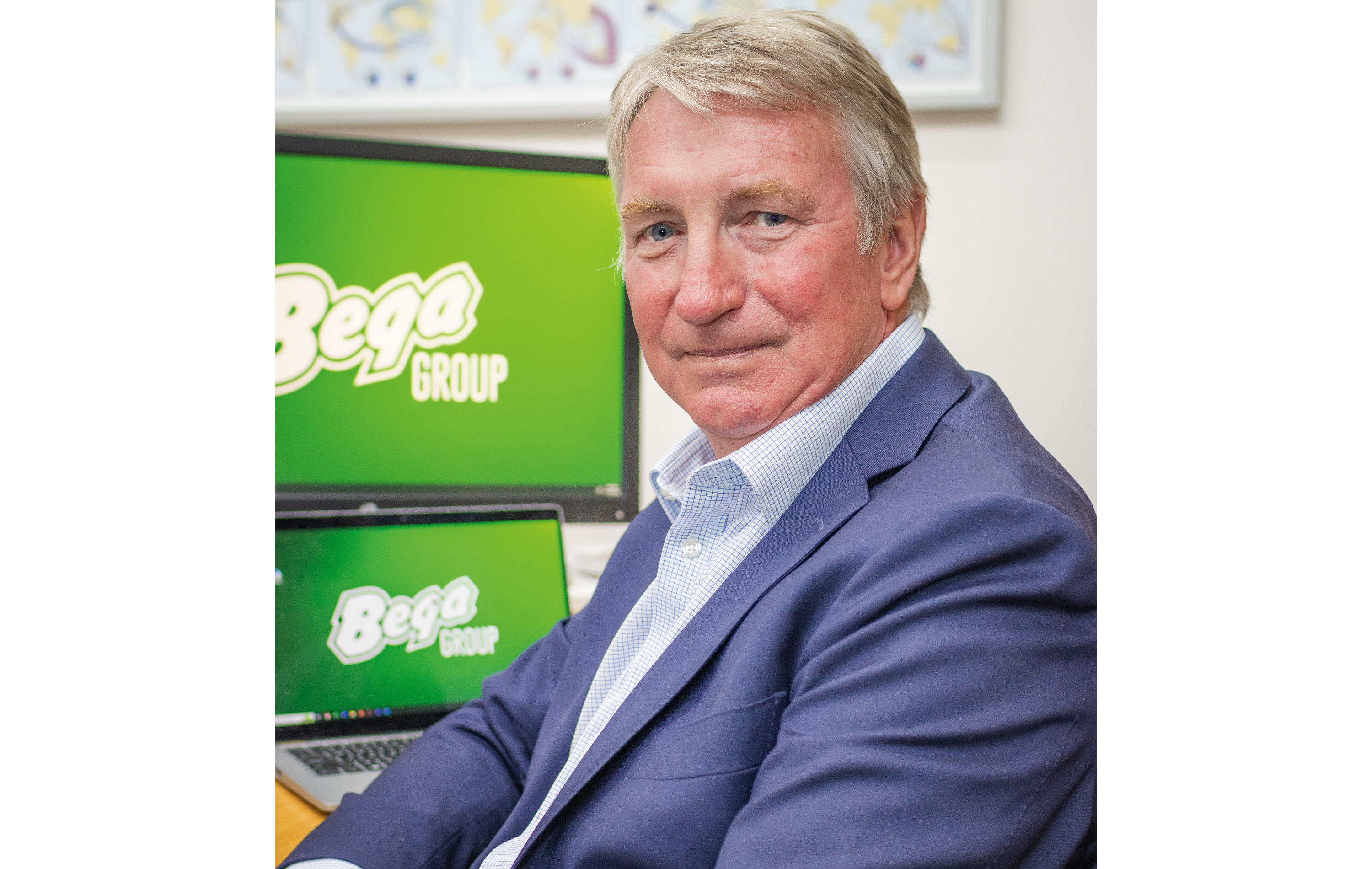
Dairy farmer and chair of the boards of the Bega Group and Giant Steps charity Barry Irvin at his Bega, NSW, office.
Giant Achiever
Growing up on a dairy farm laid the foundations for Barry Irvin’s corporate career at the helm of the Bega Group and his philanthropic achievements in educating children with autism.
STORY KIRSTY McKENZIE PHOTOS KEN BRASS | OUTBACK MAGAZINE
Barry Irvin looks like he could attach the milking cups in his sleep as he puts the cows through milking on his Bega Valley farm. He may have handed the day-to-day running of the dairy over to his son Andrew, but he moves through the rotary shed with the ease of a lifetime’s experience of the twice-a-day ritual. These days you’re more likely to catch the chair of the boards of the huge food corporation Bega Group and Giant Steps, a world-leading educational centre supporting children with autism, wearing a jacket and tie rather than gumboots and an apron, but he helps out when needed and reckons dairy experience is great preparation for handling life’s challenges. He says there’s nothing like being kicked in the ribs by a cranky cow before sunrise to help you keep perspective.
Barry’s family has been dairying on the far south coast of NSW since 1887 when his great-grandparents established their first farm. Then his grandfather took over and finally Barry’s father and his 3 brothers continued the tradition. “It was a pretty poverty-stricken environment,” he says. “Mum kept chickens and sold the eggs to buy our shoes and my sister and I milked the cows before we went to school.” Their other sister lived with disability, which added to the family’s burdens.
Much to his parents’ disappointment, Barry high-tailed it out of town to begin a career in banking. “I was just desperate to get out of here and out of poverty,” he recalls. At the bank, Barry learnt a wide range of skills, from lending and accounts management to understanding currencies and insolvency management. Barry met Harriet, who also worked for the bank, and before long they were a couple. All their dreams for the future evaporated, however, when Barry’s father died in the same week as their wedding. With his mother left to manage the farm, and neither of his sisters able to help, Barry had little option but to come home.
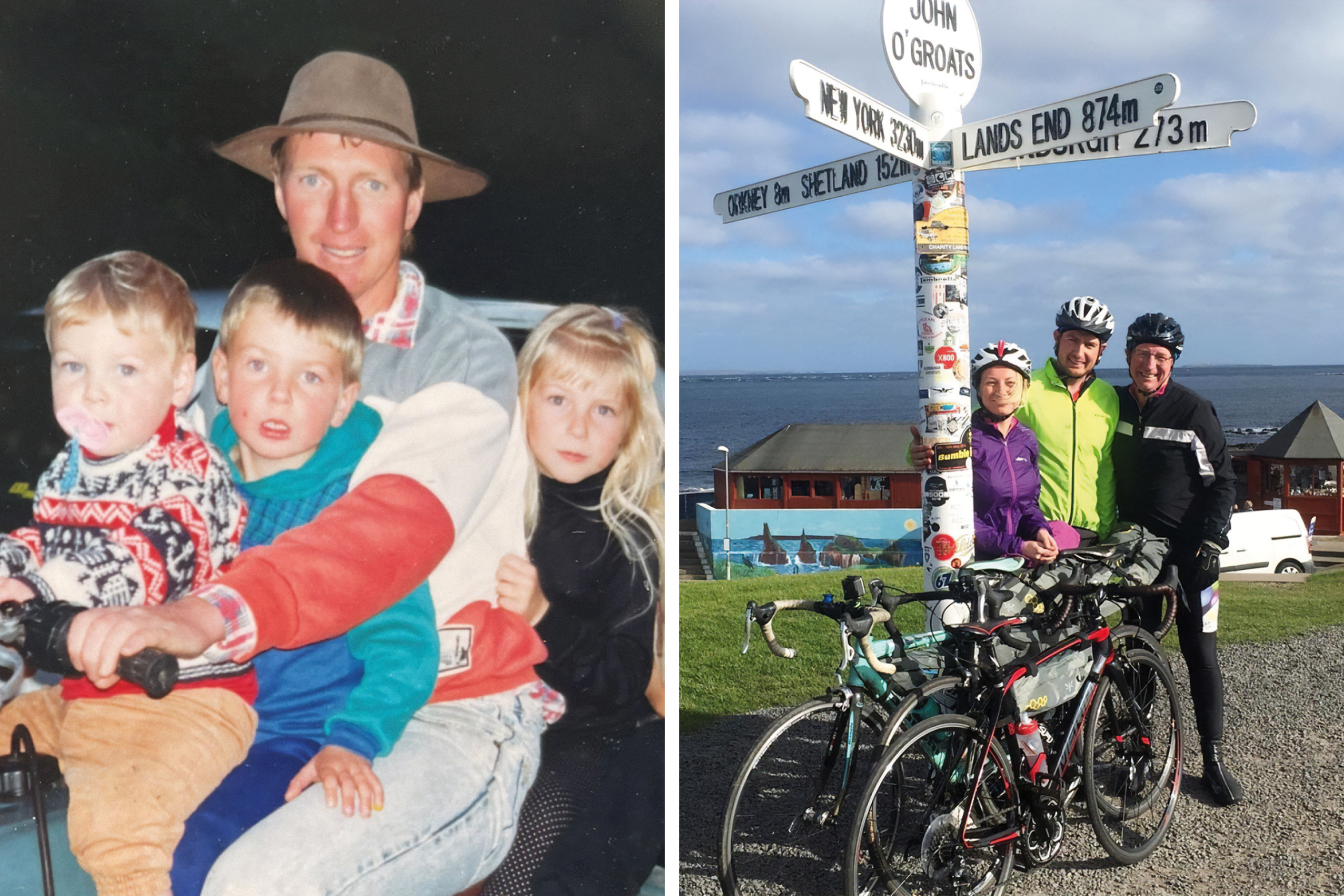
Barry with Matty, Andrew and Deborah; completing a marathon ride from the bottom of the UK to the top with Andrew and Deborah.
The next blow came when Barry discovered the farm was carrying huge debt. “Harriet, to her everlasting credit, took a job as a teller in a bank in Bega, so at least we had some income,” he recalls. “She was the one who made the biggest sacrifice.” Barry spent the first months back on the farm finding out the local businesses they owned money to. “I had to walk down Carp Street and ask every owner,” he says. “Some said they wanted the money right now, some said sort it out in your own time and I remember every person who gave me time to save the business. Then I had to go to the bank I used to work for and ask for help. I think I called in every friendship I’d ever made to get funded.”
During the late 1980s, the Irvins welcomed their children Deborah and Andrew, and Matthew came along in the early ’90s. When Matthew was about 2, Harriet noticed he wasn’t reaching his milestones and had stopped using words. He regressed dramatically over the next couple of years and was finally diagnosed as profoundly autistic. “Matty was terrified of the world and couldn’t be looked after by anyone except Harriet and me,” Barry says. “We began searching for an appropriate school for him and reached the stage where doctors were saying he would be better off institutionalised.”
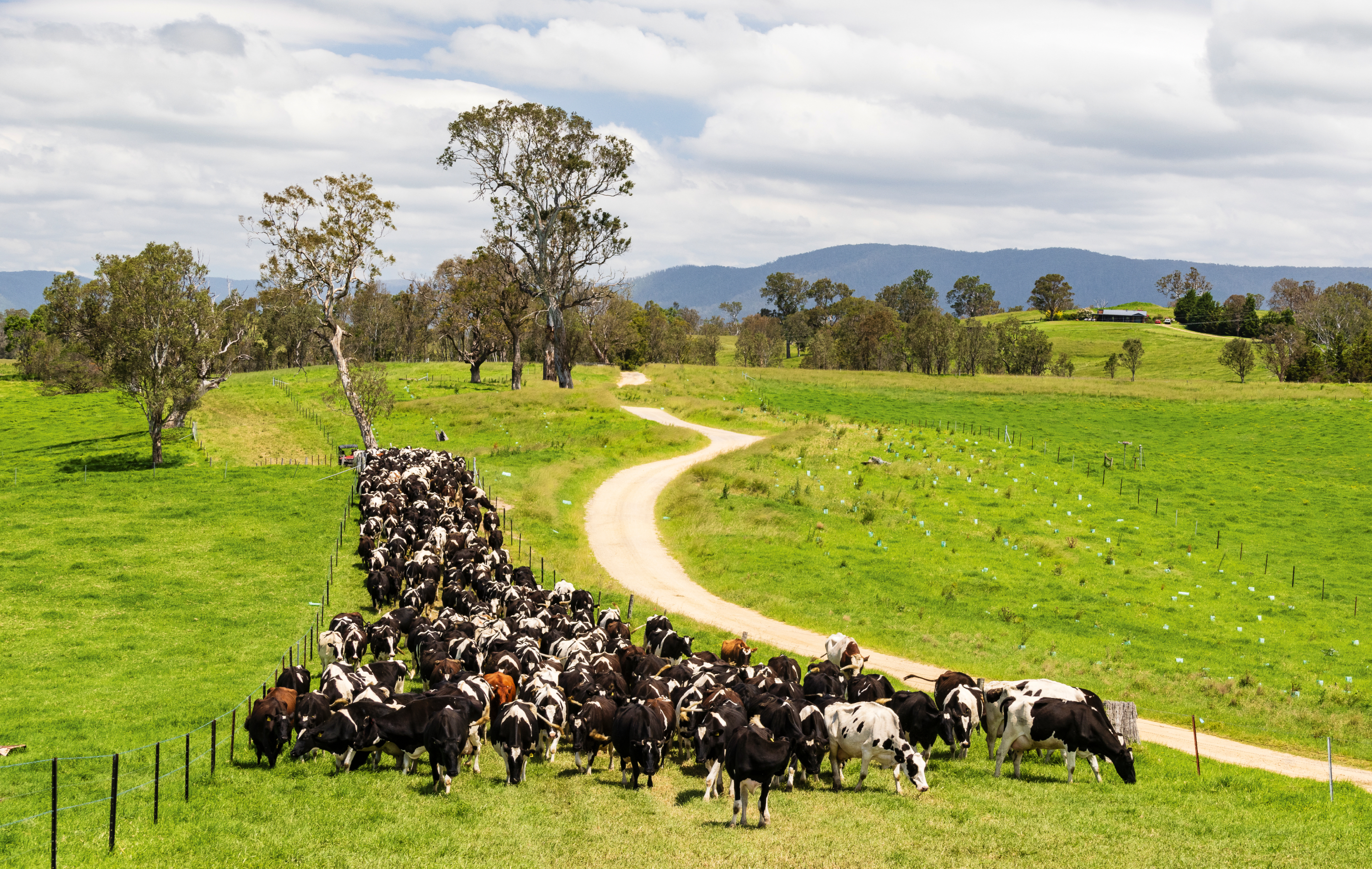
The cows come in for milking on the farm.
The Irvins eventually joined a group of 6 families in Sydney who were trying to start a school for children with autism. This prompted their move to Sydney, where they helped set up Giant Steps. In 1995, the group secured a building at the old Gladesville Hospital and opened with 12 students and 19 staff. Harriet and the children made Sydney their home base and returned to Bega for holidays, while Barry began a weekly commute – a 5-6-hour drive – that he continues to the present day. “I’d drive up from the farm to be in Sydney in time for kids’ sport on Friday and take over Matt’s primary care during the weekend,” Barry says. “In a sense, Harriet and I were each other’s respite.”
Meanwhile, Barry’s involvement in the dairy industry was ever-expanding. At the beginning of the ’80s Bega Cheese was a small cooperative, producing 3,000 tonnes of cheese a year. When Barry joined the board as part of the finance committee in 1991, they had 62 staff and were looking to expand production to 5,000 tonnes. In 2000, Barry became chairman of the company. The Bega Group now has more than 3,800 staff across 19 factories and sells to 40 countries around the world.
After a stint in corporate life, Barry’s son Andrew returned home to run the dairy farms with his wife Zoe and 6 children. Deborah and her partner Tom both work for Giant Steps.
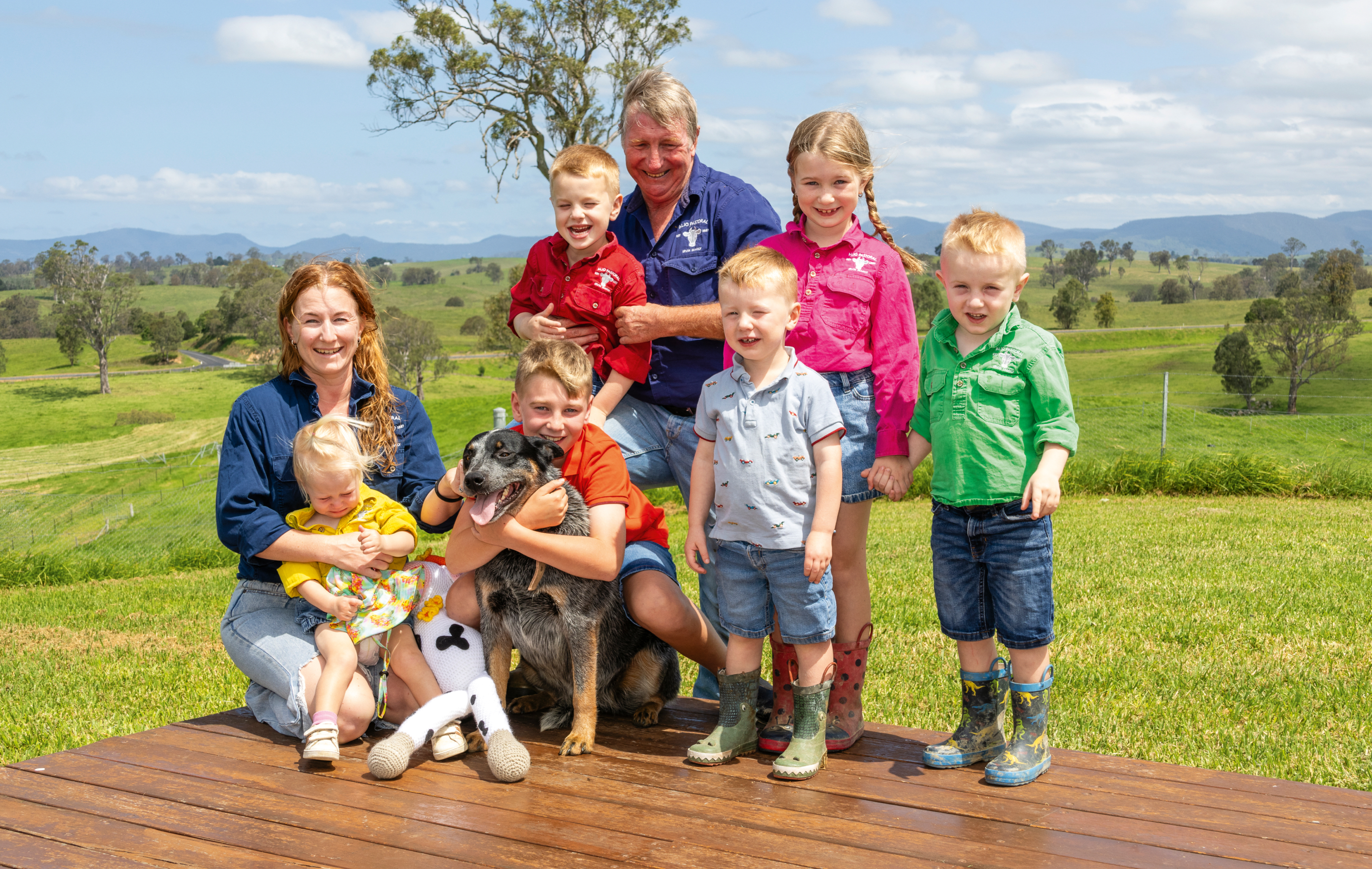
Barry with Abe on his knee, daughter-in-law Zoe holding Zara, Lex with Ruby the blue heeler and Zac, Belle and Archie.
As the Bega Group grew, so did Giant Steps. To keep up with the concurrent growth, Barry kept ramping up his commitment to both organisations. Today, there are 109 students at the Sydney school and a further 46 in the college for post-school students. A Melbourne campus opened in the suburb of Kew in 2016 and it now has 39 students in school and 10 in college, with about 50 staff.
As well as teachers there are music, speech and occupational therapists and family psychologists. It has become a training hub for people working with people with disability and the staff help train education and medical teams. The remarkable thing about Giant Steps is there are no school fees. The students come from all socio-economic backgrounds and, in what Barry calls “the world’s worst business model for the world’s best reason”, parents contribute by volunteering and fundraising for the school. These days state and federal government funding accounts for about 65% of the annual budgets.
Claire Allen, Giant Steps director of finance and administration has worked alongside Barry for almost 27 years. “Barry would deny this and say it is a team effort, but the success of the organisation can in large part be attributed to his involvement,” she says. “Yes, the team is important, but it’s his skills around governance and corporate understanding of the business that ensures Giant Steps is as successful as it is. It’s thanks to him that there’s great stability at board level. Perhaps because of the hardship he’s had in his own life, he has great empathy and he speaks warmly and from the heart. He’s also really good at building community and he always makes time to attend staff and parent nights.”
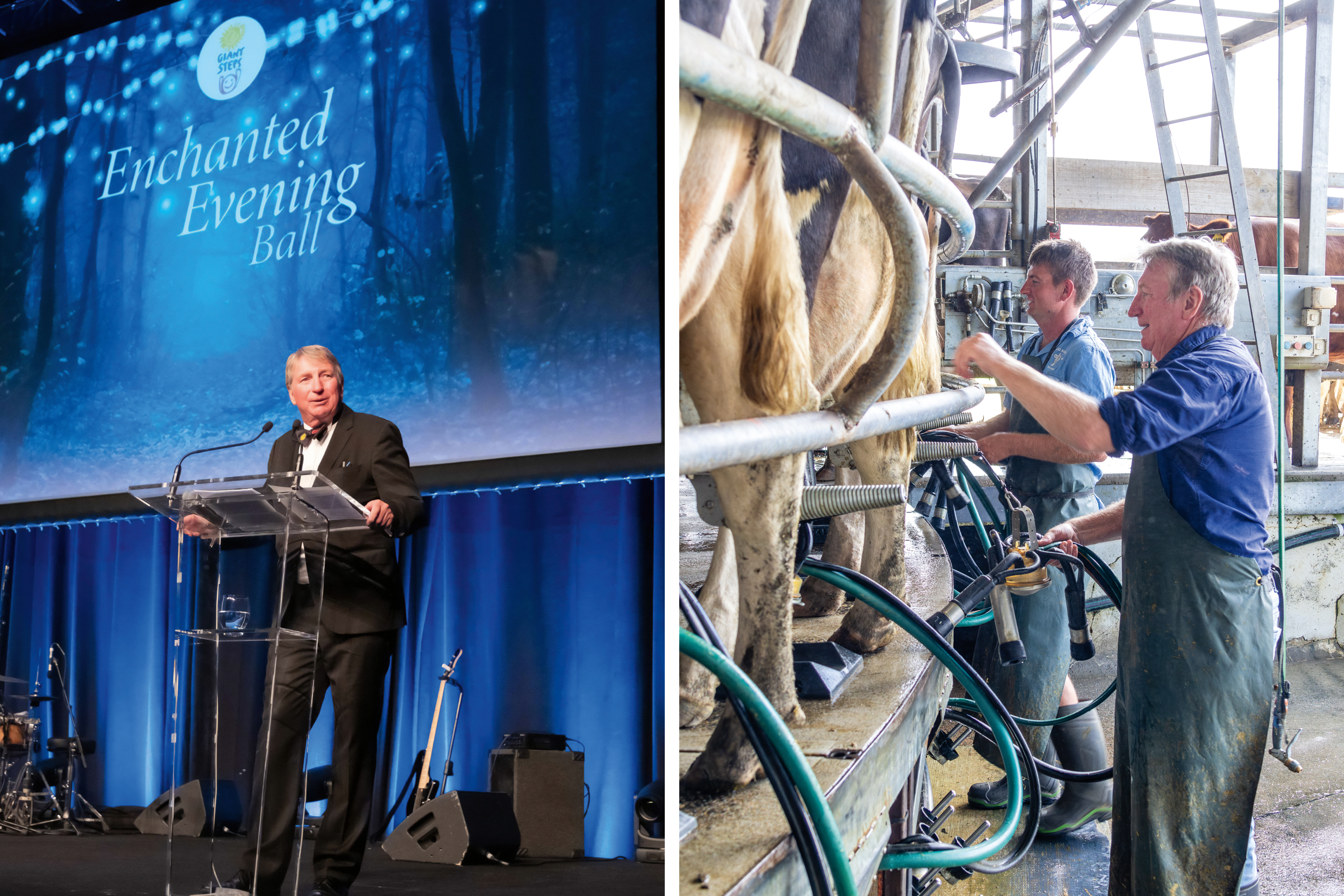
Barry speaks at a Giant Steps event; Andrew now runs the dairy, but Barry is always keen to lend a hand.
Barry applies the same tenacity to business as he does to fundraising. “From the outset, we quietly did deals that strengthened Bega,” he says. “Our early modus was to make money out of being the best service provider to bigger companies.” The metamorphosis of a provincial dairy co-op into a giant public food corporation began in 2007 when Bega bought Tatura Milk Industries, which took the company into new markets in Asia with infant formula and cream cheeses. An ASX listing in 2011 was the next step. The big surprise came in 2017 with the purchase of Vegemite and a peanut butter brand, followed in 2021 by the takeover of Lion Dairy and Drinks. “I’ve never had a problem keeping perspective,” Barry says. “My roots as a dairy farmer and caring for Matty help. Matty doesn’t care who I am, he just needs me to look after him.”
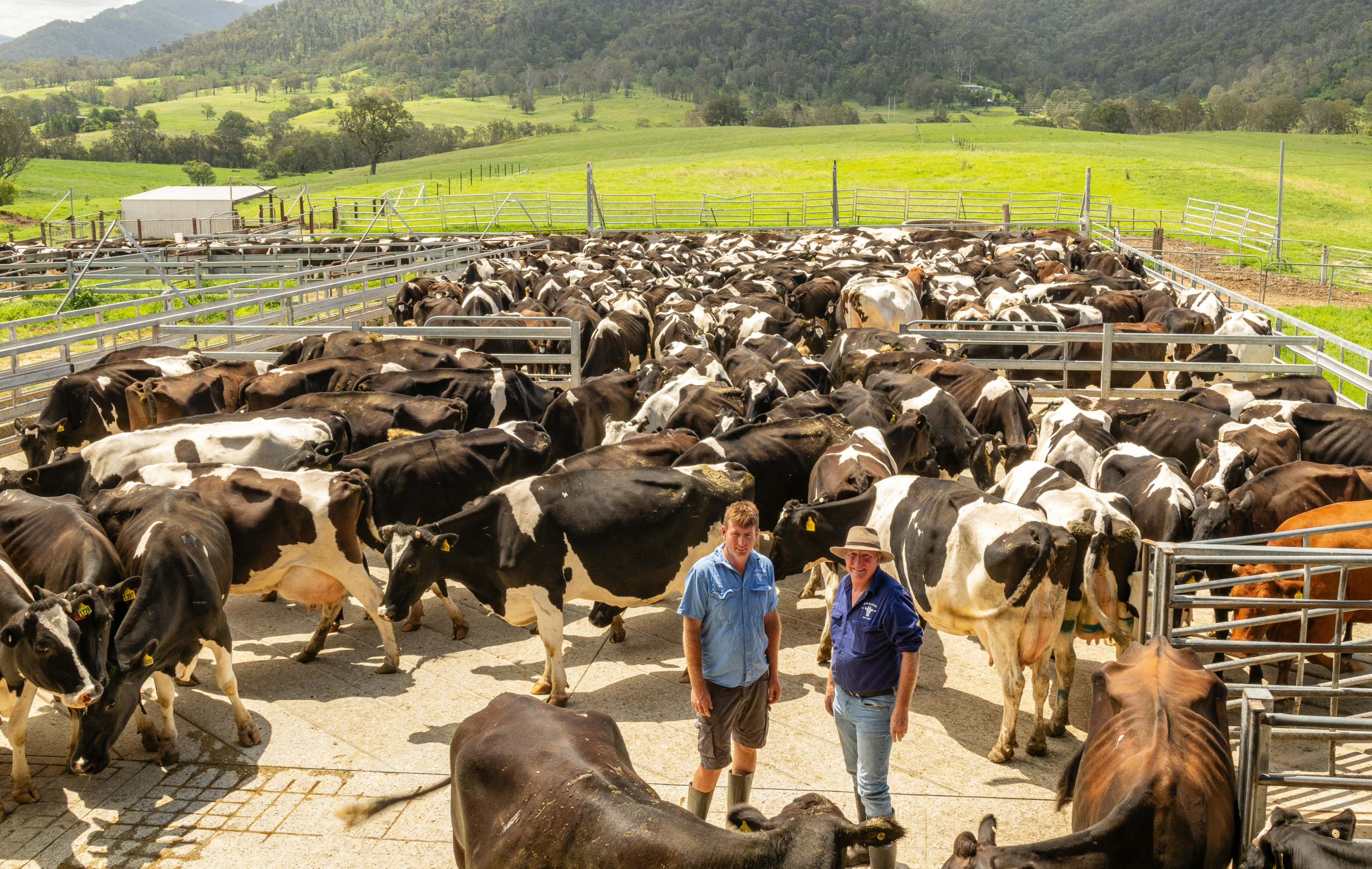
In his ‘spare’ time, Barry fundraises for Giant Steps and enjoys long-distance hiking and cycling challenges. Sometimes the two overlap, as Barry has participated in long-distance bike events for Giant Steps. “As I approached my 40s I was advised not to play contact sport and take up something more sensible,” he says. “At the time cycling was the new golf among executives. In 2005, we came up with the idea of a fundraising bike ride for Giant Steps from Tathra to the top of Kosciusko and that’s when I really got into bike riding.” Apart from a 2-year pause during COVID, there’s been a ride every year since and it usually adds $200,000 to the Giant Steps coffers. Cycling has also found its way into the Bega Group’s culture with the TAT 200, a 200km bike ride that raises funds for northern Victorian communities.
“I was never madly into long-distance stuff, but as Deborah and Andrew got into their teenage years I realised I had to work harder to keep connection with them,” Barry says. “I decided we had to find something to do that was challenging and where devices didn’t work.” Through the years, they’ve done everything from walking the Inca Trail and Kokoda, to kayaking down the Zambezi and cycling Land’s End to John O’Groats.
Compared with working in the dairy, Barry says the long-distance challenges are easy. “I’m used to early starts and being on my feet all day,’’ he says. “On the one hand, your world slows down and life becomes very simple. You walk as far as you’re capable, you find food and somewhere to sleep and somehow it takes all your concentration to achieve those 3 things. I don’t relax by doing nothing. I relax by turning my work brain off and focusing on the task of finding my way.”
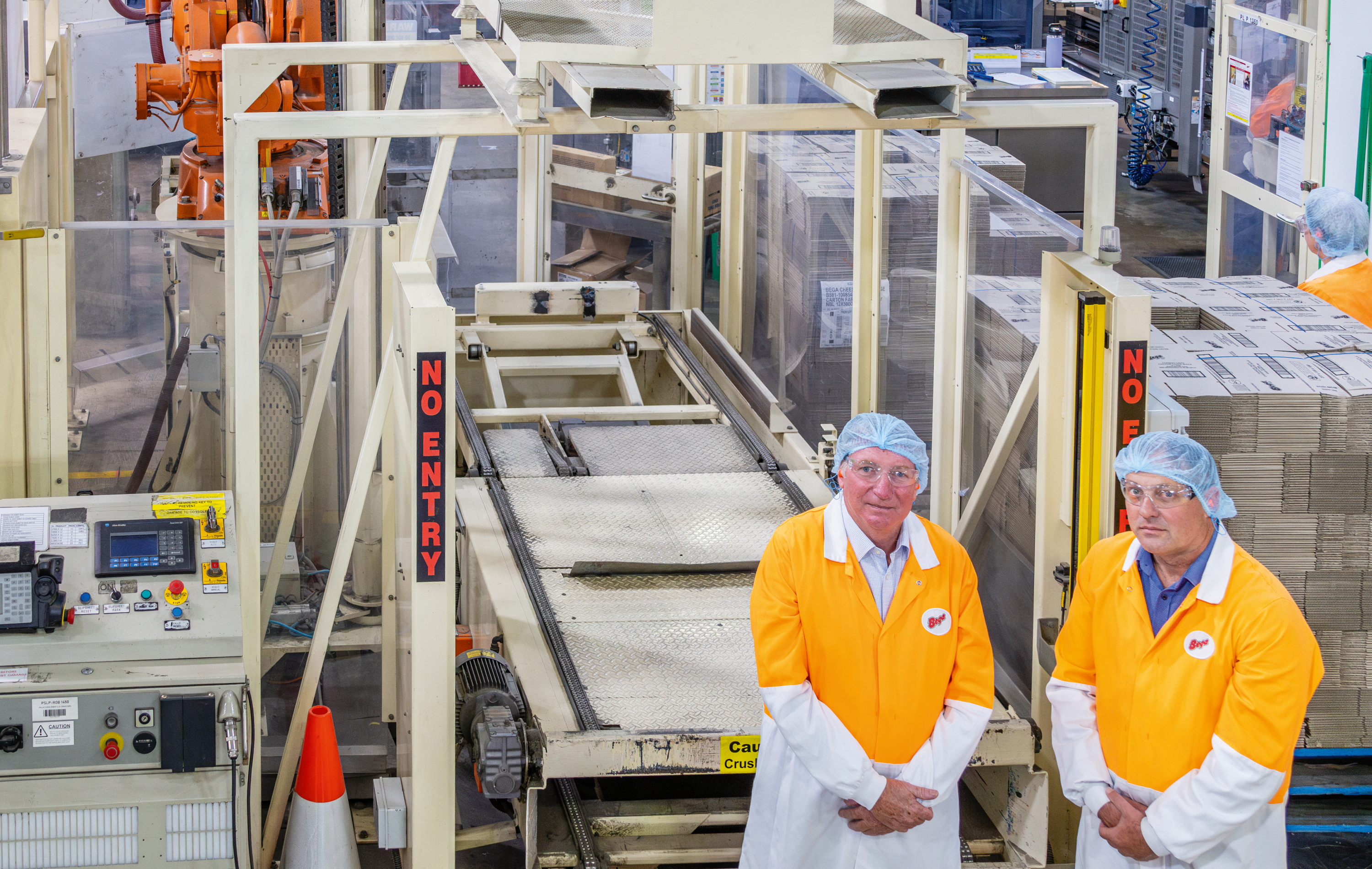
On the factory floor in Bega with site manager Leon Garner.
Corporate lawyer David Ferguson has worked with Barry since his early days on the Bega Co-op board. Their friendship grew through mutual music tastes – Fleetwood Mac and Debbie Harry’s Blondie – and raising kids of similar age. They also bonded through cycling and have ridden together on numerous occasions. “Barry’s worst nightmare would be a holiday in a resort,” David says. “We rode London to Paris for a ‘holiday challenge’ and towards the end, when your body starts to lose physical ability, Barry just pushes harder. On rides, he’s very generous with assistance, changing tyres and encouraging the others. He doesn’t want to break records, but he’ll be driven to the finish.”
Barry was forced to slow his pace in 2019 when he was diagnosed with bowel and stomach cancer. Surgery, followed by 9 months of “pretty brutal” chemotherapy, left him unable to work. “I just had to focus on my recovery,” he says.
Five years down the track, the only giveaway are the gloves Barry dons as he jumps on the quad bike to move the cows back to the paddock. As a result of the chemo he still suffers from neuropathy due to nerve damage to his hands and feet. “They say the throbbing is the nerves healing, but in the grand scheme of things, it’s not much to complain about,” he says. “I am the most checked person in Australia. I won’t die anytime soon of anything else and I don’t have much chance of dying of cancer. My blood tests are now 3-monthly, and they will become less frequent as the years go by.”
At 61, Barry says he will always help Andrew on the farm, but at some stage he will bow out of public life. “The Bega Group will no longer need me,” he says “From talking to people who’ve played sport at a high level, I know that a time will come when I don’t feel I have enough to offer or the energy to keep doing the job. The important thing is that you plan a staged change. There have been multiple CEOs at Bega and all evolutions have been planned. The same applies at Giant Steps: there’s never been turmoil, just respectful change.”
Looking back on his “lucky life”, Barry reckons “the greatest value of success is that it makes you game to try other things. I have been gifted with a curiosity about improvement. Mum always said, ‘know your place’, but you can know your place and want to do better. That’s all I’ve ever wanted to do.”